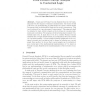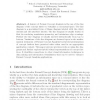549 search results - page 3 / 110 » Using Formal Concept Analysis in Mathematical Discovery |
JETAI
2002
13 years 5 months ago
2002
We outline the rationale and preliminary results of using the State Context Property (SCOP) formalism, originally developed as a generalization of quantum mechanics, to describe t...
FCA
2005
Springer
13 years 11 months ago
2005
Springer
Abstract. A main goal of Formal Concept Analysis from its very beginning has been the support of rational communication. The source of this goal lies in our understanding of mathem...
IJMMS
2000
13 years 5 months ago
2000
We survey five mathematical discovery programs by looking in detail at the discovery processes they illustrate and the success they've had. We focus on how they estimate the ...
ORDER
2002
13 years 5 months ago
2002
The framework and the basic results of Wille on triadic concept analysis, including his Basic Theorem of Triadic Concept Analysis, are here generalized to n-dimensional formal cont...
ICFCA
2010
Springer
13 years 10 months ago
2010
Springer
A feature of Formal Concept Analysis is the use of the line diagram of the concept lattice to visualize a conceptual space. The line diagram is a specialized form of Hasse diagram ...


